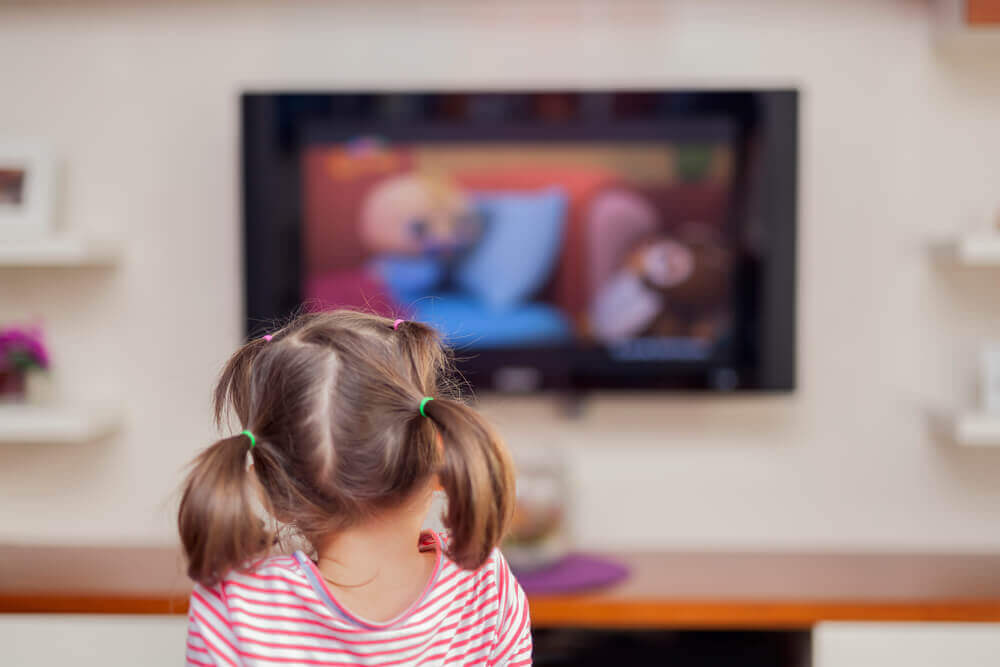Binge Watching in Children: What You Should Know

Have you ever seen the entire season of a series in a couple of days? Your answer to this question may be yes, as this is an increasingly common practice in our society. If you’ve succumbed to bingeing on series at some point, you’ll surely recognize the anxiety to continue watching the next episode and the void that appears when the series finally ends. Well, you should know that this is known as binge watching and that it also affects your children.
The new way of watching television
Until not long ago, we had to wait a whole week to see how our favorite series would continue. However, with the arrival of streaming platforms, this dynamic has changed. Now, we have the full contents available in a single day. Without a doubt, you know what the consequences of this change are.
Our need for immediacy has increased dramatically, and in the case of children, this can have far more serious repercussions.

What is binge watching?
Binge watching is a term that refers to the famous “series marathon” and basically consists of consuming a large amount of audiovisual content in a short period of time.
When we do it, we don’t do it consciously and deliberately. On the contrary, we act motivated by impulse, and sometimes, we even neglect or postpone other tasks and activities that we have pending. It is, therefore, a kind of addiction.
This phenomenon has come into our lives hand in hand with on-demand content platforms, such as Netflix or Disney +, and affects adults, young people, and children alike.
However, it’s not a chance or random event. In fact, there are well-studied mechanisms that exist with the purpose of getting people hooked on these series. Among them, the following stand out:
- Release of content in block: Instead of adding the episodes progressively, these platforms choose to offer us complete seasons or even an entire series at one time.
- Automatic chaining of chapters: When an episode ends, we don’t have to do anything or decide if we want to see another. That’s because, after a few seconds, the next episode appears on the screen.
- The ability to skip the summary, introduction, and credits: The human mind has little tolerance for waiting, and with all these facilities, they get us to continue with the marathon, without even thinking about it.
- When it comes to targeting children, interactive and playful elements are also added, which manage to capture even more attention and keep them interested for longer.
How does binge watching affect children?
When a child watches a series with all the characteristics and facilities we’ve mentioned above, they may develop a kind of hook or addiction.
By consuming audiovisual content, the brain activates the reward system and begins to release dopamine. This neurotransmitter not only causes pleasure from this activity but also encourages you to continue it over and over again. In this way, the brain itself urges us to continue advancing with more episodes.
Although this happens at all ages, children aren’t yet mature enough to control their impulses or delay gratification. Therefore, they’re more likely to fall into this type of abusive consumption.
In addition, binge watching causes us to immerse ourselves completely in the content. Because the exposure is constant, little ones live the experience with great intensity. They develop great empathy towards the characters and become deeply involved.
Therefore, when the series ends, they often experience a kind of depression or emotional downturn similar to what happens to adults. However, the difference is that their mind is still developing. They don’t have the necessary resources to manage these emotions.
At the same time, we can’t ignore the fact that this addiction to audiovisual content can lead children to neglect or abandon other activities that are of the utmost importance. For example, family life, free play, or socialization with other children.

Prevent your children from binge watching
We adults can barely control our need to watch episode after episode. So, we can’t ask children to be in control enough to stop on their own with time. Therefore, it’s the parents’ job to ration television consumption and ensure compliance with the other much-needed activities.
Audiovisual media are entertaining and can host playful and educational content for children. However, if they’re not used in moderation, they can lead to addictive consumption that’s very harmful to the health of minors.
For all of these reasons, we advise you to be firm and set limits to control the time your children spend in front of the screens.
Have you ever seen the entire season of a series in a couple of days? Your answer to this question may be yes, as this is an increasingly common practice in our society. If you’ve succumbed to bingeing on series at some point, you’ll surely recognize the anxiety to continue watching the next episode and the void that appears when the series finally ends. Well, you should know that this is known as binge watching and that it also affects your children.
The new way of watching television
Until not long ago, we had to wait a whole week to see how our favorite series would continue. However, with the arrival of streaming platforms, this dynamic has changed. Now, we have the full contents available in a single day. Without a doubt, you know what the consequences of this change are.
Our need for immediacy has increased dramatically, and in the case of children, this can have far more serious repercussions.

What is binge watching?
Binge watching is a term that refers to the famous “series marathon” and basically consists of consuming a large amount of audiovisual content in a short period of time.
When we do it, we don’t do it consciously and deliberately. On the contrary, we act motivated by impulse, and sometimes, we even neglect or postpone other tasks and activities that we have pending. It is, therefore, a kind of addiction.
This phenomenon has come into our lives hand in hand with on-demand content platforms, such as Netflix or Disney +, and affects adults, young people, and children alike.
However, it’s not a chance or random event. In fact, there are well-studied mechanisms that exist with the purpose of getting people hooked on these series. Among them, the following stand out:
- Release of content in block: Instead of adding the episodes progressively, these platforms choose to offer us complete seasons or even an entire series at one time.
- Automatic chaining of chapters: When an episode ends, we don’t have to do anything or decide if we want to see another. That’s because, after a few seconds, the next episode appears on the screen.
- The ability to skip the summary, introduction, and credits: The human mind has little tolerance for waiting, and with all these facilities, they get us to continue with the marathon, without even thinking about it.
- When it comes to targeting children, interactive and playful elements are also added, which manage to capture even more attention and keep them interested for longer.
How does binge watching affect children?
When a child watches a series with all the characteristics and facilities we’ve mentioned above, they may develop a kind of hook or addiction.
By consuming audiovisual content, the brain activates the reward system and begins to release dopamine. This neurotransmitter not only causes pleasure from this activity but also encourages you to continue it over and over again. In this way, the brain itself urges us to continue advancing with more episodes.
Although this happens at all ages, children aren’t yet mature enough to control their impulses or delay gratification. Therefore, they’re more likely to fall into this type of abusive consumption.
In addition, binge watching causes us to immerse ourselves completely in the content. Because the exposure is constant, little ones live the experience with great intensity. They develop great empathy towards the characters and become deeply involved.
Therefore, when the series ends, they often experience a kind of depression or emotional downturn similar to what happens to adults. However, the difference is that their mind is still developing. They don’t have the necessary resources to manage these emotions.
At the same time, we can’t ignore the fact that this addiction to audiovisual content can lead children to neglect or abandon other activities that are of the utmost importance. For example, family life, free play, or socialization with other children.

Prevent your children from binge watching
We adults can barely control our need to watch episode after episode. So, we can’t ask children to be in control enough to stop on their own with time. Therefore, it’s the parents’ job to ration television consumption and ensure compliance with the other much-needed activities.
Audiovisual media are entertaining and can host playful and educational content for children. However, if they’re not used in moderation, they can lead to addictive consumption that’s very harmful to the health of minors.
For all of these reasons, we advise you to be firm and set limits to control the time your children spend in front of the screens.
All cited sources were thoroughly reviewed by our team to ensure their quality, reliability, currency, and validity. The bibliography of this article was considered reliable and of academic or scientific accuracy.
- Trouleau, W., Ashkan, A., Ding, W., & Eriksson, B. (2016, August). Just one more: Modeling binge watching behavior. In Proceedings of the 22nd ACM SIGKDD International Conference on Knowledge Discovery and Data Mining (pp. 1215-1224).
- Fung-Fallas, M.P., Rojas-Mora, E.J. & Delgado-Castro, L.G. (2020) Impacto del tiempo de pantalla en la salud de niños y adolescentes. Revista Médica Sinergia, 5(6), e370. DOI: https://revistamedicasinergia.com/index.php/rms/article/download/370/866?inline=1
- Riddle, K., Peebles, A., Davis, C., Xu, F., & Schroeder, E. (2018). The addictive potential of television binge watching: Comparing intentional and unintentional binges. Psychology of Popular Media Culture, 7(4), 589.
This text is provided for informational purposes only and does not replace consultation with a professional. If in doubt, consult your specialist.








